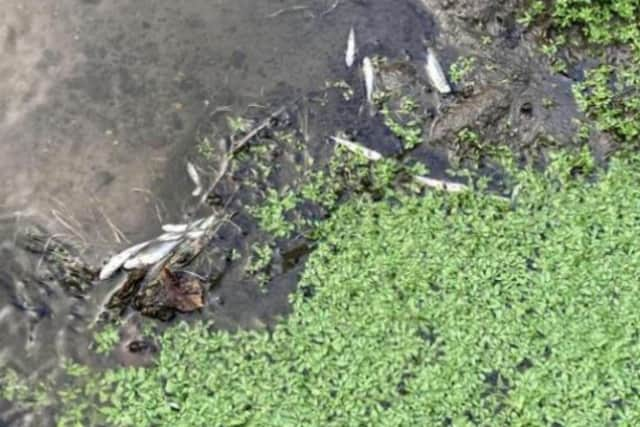Criminal investigation underway to find polluters who leaked oil into North Yorkshire stream
The Environment Agency said it is making enquiries after heating oil polluted the stream in Elvington and whoever is responsible could face criminal charges.
However, the agency has also claimed the leak did not cause the deaths of hundreds of fish which were found earlier this week.
Advertisement
Hide AdAdvertisement
Hide AdThe spill was first reported in January and Councillor Christian Vassie, of City of York Council, has claimed that a local business, which uses the oil but does not sell it, is to blame.


He said the Environment Agency has ordered the business to fix the leak and clean up the polluted area, but it should consider a prosecution “if the matter is not resolved”.
A spokeswoman for the agency said: “As this is an ongoing criminal investigation, we would be unable to comment further in order not to prejudice our enquiries.”
It has powers to prosecute businesses suspected of criminal offences, impose fines and issue ‘stop notices’ to put an end to activities causing environmental harm.
Advertisement
Hide AdAdvertisement
Hide AdLast month, Environment Secretary Therese Coffey announced the £250,000 limit on civil penalties imposed on polluters by the Environment Agency and Natural England will be scrapped.


The move will allow the regulators to issue significantly larger fines to a range of businesses, including water companies and waste operators, without having to go through lengthy criminal prosecutions.
The Environment Agency is conducting a separate investigation, after hundreds of fish were found dead in the stream near Elvington Church of England Primary School.
It said the cause is currently unknown, but there is no evidence to suggest the deaths are linked to a heating oil leak and the dissolved oxygen level in the water “was good”.
Advertisement
Hide AdAdvertisement
Hide AdIn June, the EA responded to a large number of fish deaths in rivers and streams around the country, following a spell of hot weather.
The agency said extreme temperatures and thunderstorms can be “highly dangerous” for fish, but deaths are often caused by a combination of several factors including water levels or flows, algal blooms, pollution and diseases.
When Environment Agency workers find fish in distress during periods of dry weather, they sometimes use aeration equipment to reoxygenate the water or rescue fish when river flows are especially low.
The Canal and Rivers Trust said the hot weather and storms in June “caused an unprecedented number of incidents” involving dead fish.
Advertisement
Hide AdAdvertisement
Hide AdIt responded to incidents at more than 60 locations across 21 different canals in that month, after dealing with six throughout 2022.
According to the trust, the amount of oxygen in the water “naturally reduces” when temperatures rise and storms bring runoff containing pollutants.
The Angling Trust claimed waterways are “unable to cope” with a change in temperature and sustain healthy fish populations, because they have been devastated by pollution from various sources.